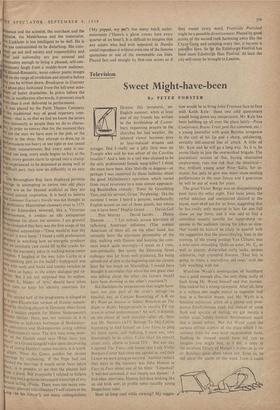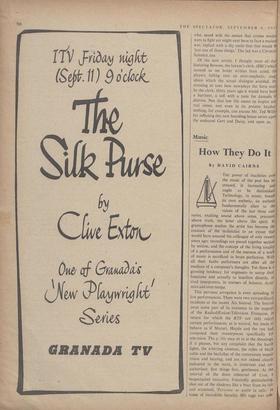Television
Sweet Might-have--been
By PETER FORSTER
DURING this unnatural, un- English summer, when at least one of my friends has written to the Archbishop of Canter- bury requesting prayers in the churches for bad weather, the inboard viewer becomes prey to heat-induced dreams and mirages. Did I really see a jolly little man on Tonight who said he was editor of the Carolina Israelite? And a lady in a veil who claimed to be the only professional female wasp-killer? I think she must have been Alan Melville in disguise—or perhaps I was unnerved by those bulletins about the good Michelmore's operation, which varied from royal reverence to a tone almost approach- ing Restoration comedy: 'Enter Sir Grumbling Turn, and his servant, Gripe.' Perplexing: like the moment I swear I heard a genuine, unaffectedly English accent on one of those panels, but whose can it have been? Hughie Green . . . David Gell . . . Pete Murray . . . David Jacobs . . . Dickie Dawson . . . ? Let nobody accuse television of reflecting American influence. (The • noblest American of them all, on the other hand, has certainly been the television personality of the day, walking with Queens and keeping the com- mon touch quite movingly—I speak as I view, non-politically. But surely the Downing Street colloquy was far from well produced, Ike being almost out of shot at the beginning and the camera later far too much on Macmillan. I would have thought it axiomatic that when the one great man was talking about the other, the camera should have been showing us the other's reactions?)
But doubtless the programmes-that-might-have- been are also part of the critic's mirage--as fanciful, say, as Captain 13rownrigg of A-R on We Want an Answer or Sidney Bernstein on The Right to Reply. Inappropriate to involve TV top brass in actual performances? Ah well, it depends on the object of each exercise—after all, there was Mr. Norman (ATV Belongs To Me) Collins happening to find himself on Late Extra to plug his latest novel, and replying, I must say, very disarmingly to its critics. I also liked his remark about early efforts to found ITV : 'But one day I opened The Times and found that Lady Violet Bonham Carter had come out against us, and then I knew we were going,to succeed.' Another remark that stays in the memory was John Huston in Face to Face about one of his films : 'Censored? It was not censored, it was simply not shown!' A first-class interview, Huston full-face looking like an old Irish seer, in profile some rascally young Hogarthian valet.
How to keep cool while viewing? My sugges-
tion would be to bring John Freeman face to face with Keith Kyle : those two cold questioners would bring down any temperature. Mr. Kyle has been bobbing up all over the place lately—Press Conference, Brains Trust, post-Ike comment, etc. : a young journalist with quite Byronic arrogance in the curl of his lip and a sharp, unfaltering, enviably self-assured line of attack. A little of Mr. Kyle and he will go a long way. As it is, he seems likely to join the overworked brigade. The journalistic section of this, having alternative employment, runs less risk than the theatrical— that brilliant young actor Peter Sallis, for in- stance, has only to give one more show-stealing performance in the near future and I guarantee he will be out of work for years.
The great Victor Borge was on disappointingly poor form the other night. Two basic jokes, the verbal solecism and unexpected discord at the piano, were eked out for an hour, suggesting that he has really only material in him for one full show on top form, and it was odd to find a comedian -usually notable for super-sharp re- sponse to the audience timing 'his jokes so slow. Nor would he himself be likely to quarrel with the suggestion that the piano-playing, later in the evening, of the young prodigy Van Cliburn, was a mite more rewarding. Quite an actor, Mr. C., as well as pianist; dishevelled curly locks, serious sideburns, rapt crumpled features. 'That boy is going to make a marvellous old man,' said the lady watching with me.
Woodrow Wyatt's investigation of Sandhurst was a good enough idea, the only thing really at fault being Mr. Wyatt himself and that manner. One looked for a strong viewpoint. After all, here is a subject one might expect to engender real heat in a Socialist breast, and Mr. Wyatt is a Socialist politician, albeit of a plump and pros- perous Establishment kind; but instead of some flash and sparkle of feeling, we got merely a rather snide,–mildly ironical documentary much like a dozen others. Nor did Wyatt catch the curious offbeat aspects of the place which I re- member from my own brief incarceration there. Nothing he showed would have led you to imagine you might find, as I did, a copy in the excellent library of M urger's Scenes de la .vie de Boheme, quite often taken out. Even so, he did elicit the quote of the week from a cadet who, taxed with the notion that armies neede wars to fight yet might next have to face a nuclea war, replied with a shy smile that that would lust one of those things.' The lad was a Christian Scientist, too.
Of the new serials, I thought most of that featuring Bossom, the lawyer's clerk, (BBC) which seemed to me better written than acted, the players falling into an over-emphatic, stagy idiom which the actual dialogue avoided. In teresting to nate how nowadays the hero must be the clerk; thirty years ago it would have been a barrister, a toff with a taste for damsels in distress. Not that low life seems to inspire any real comic zest even in its present heyday; nothing, for example, can excuse Mr. Ted Willis for inflicting this new boarding-house series upon the endeared Gert and Daisy, and upon us.



































 Previous page
Previous page